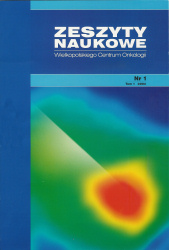Abstract
Proton Beam Radiotherapy is an emerging new technology in radiation oncology. The current debate underlines the lack of adequate number of randomized clinical trials (RCTs) to prove its clinical priority. This paper sums up the present state-of-art and disputes with the need of using RCTs in the assessment of protontherapy.
References
. Strona internetowa PTCOG: https://ptcog.ch, dostęp 25.05.2019
. Timmermann B. Clinical Rationale for Proton Beam Radiotherapy, “Particle Therapy ESTRO Course”, Groningen, Holandia, 18-22.03.2019
. Malicki J et al. Strategia Rozwoju Protonoterapii w Polsce, Warszawa 2018
. Goitein M, Cox JD. Should randomized clinical trials be required for proton radiotherapy? J Clin Oncol. 2008;26(2):175-6.
. Bentzen SM. Randomized controlled trials in health technology assessment: Overkill or overdue? Radiotherapy and oncology, 2008,86(2):142-147
. Lilford RJ, Brown CA, Nicholl J. Use of process measures to monitor the quality of clinical practice. BMJ 2007; 335:648–650. [PubMed: 17901516]
. Liao Z, Lee JJ, Komaki R, Gomez DR, O’Reilly MS, Fossella FV et al. Bayesian Adaptive Randomization Trial of Passive Scattering Proton Therapy and Intensity-Modulated Photon Radiotherapy for Locally Advanced Non–Small-Cell Lung Cancer, J Clin Oncol 2018; 36(18):1813:1822
. Rawlins M. De testimonio: on the evidence for decisions about the use of therapeutic interventions, Lancet 2008; 372(9656):2152-61
. Smith GC, Pell JP. Parachute use to prevent death and major trauma related to gravitational challenge: systematic review of randomised controlled trials. BMJ. 2003; 327:1459–1461.
. EPTN Meeting, ESTRO Forum 2018, Barcelona
. Langendijk JA, Lambin P, De Ruysscher D, Widder J, Bos M, Verheij M. Selection of patients for radiotherapy with protons aiming at reduction of side effects: the model-based approach. Radiother Oncol. 2013;107(3):267-73.
